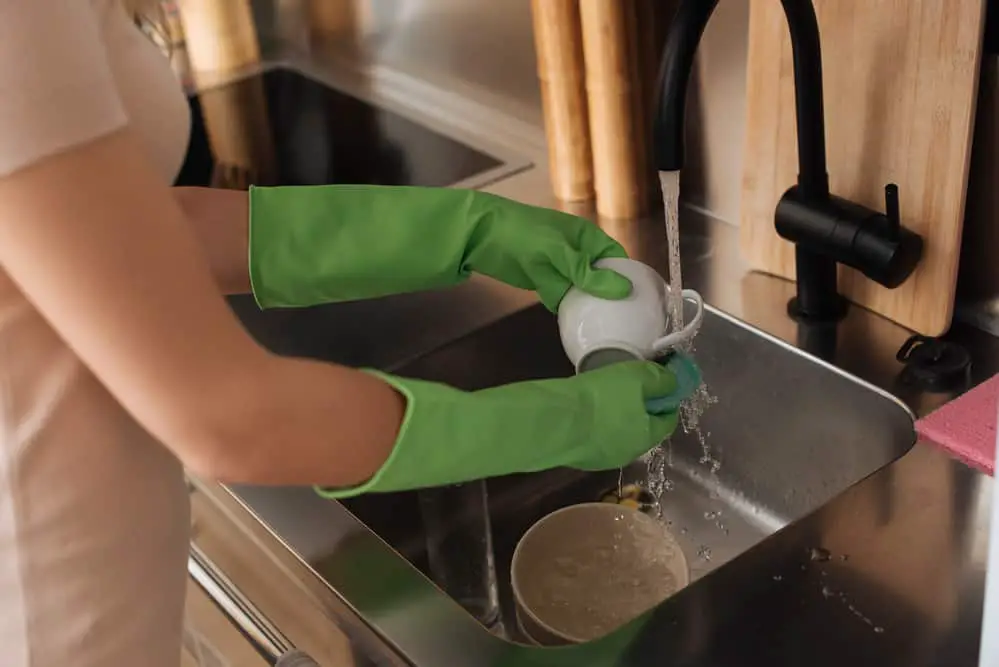Washing dishes with soap is a common practice in many homes and places that serve food.
For this reason, many people never consider doing their dishes without soap.
But sometimes you may have dirty dishes and don’t have soap to wash them. What then do you do?
So, Can You Wash Dishes with Only Water and No Soap?
You can wash your utensils using only hot water without soap. Unlike what many people think, dishwashing soap isn’t a must when washing dishes. Remember that the purpose of cleaning your utensils is to remove food particles and grease and get rid of pathogens that remain on them. Hot water alone effectively removes these and kills dangerous bacteria on the utensils. After all, water can rinse away most of what we eat.
Why Is Hot Water Enough to Clean Dishes?
1. Leaves Your Dishes Extremely Clean
Hot water gets rid of food and grime from your dishes.
Therefore, you won’t need to use time or energy to scrub them.
Plus, since hot water alone is enough, it will save you the money you’d have spent on buying dishwashing products.
2. Kills All Pathogens
Bacteria and other living organisms cannot survive in a scorching environment.
Therefore, washing your cups and plates with hot water ensures that your dishes remain bacteria-free, reducing the risk of exposure to bacteria.
3. Removes Grease
If you usually wash your dishes with cool water, you may have noticed a greasy film on them once they dry.
Water has a grease-cutting ability, but cool temperatures severely reduce it.
Therefore, once the dishes are dry, they may have a greasy film, forcing you to re-wash.
4. Dishes Dry Fast
Hot water dries quickly compared to cool or warm water.
As dishes dry themselves when rinsing with hot water.
Therefore, it eliminates the need to dry dishes with towels or napkins, which can introduce bacteria to your clean utensils.
How Do You Wash Dishes Using Just Hot Water?
First, you start by boiling the water. This is the ensure that dirt and bacteria will be removed from your utensils.
Then, pour the hot water into the sink and soak your dishes.
Please avoid splashing water on yourself when doing that.
You should also note that soaking dishes used to eat/drink dairy may produce a foul smell when you soak them.
However, the smell will disappear once you rinse them with hot water.
How Do You Wash Dishes without Soap?
Many people don’t imagine doing dishes without soap.
But, if you find yourself without dish soap and can’t run to the shop for some reason, what happens then?
The good news is that you can wash dishes without soap.
For instance, you can use plain hot water as discussed above.
However, this isn’t the only way to clean dishes without some. You can still use various things as a replacement for dishwashing soap. These include;
1. Using Baking Soda
Baking soda has various uses in the kitchen. It cleans, deoxidizes, and removes odor from substances.
Therefore, it is a perfect alternative to use when you don’t have soap.
Here are the steps of using baking soda to clean dishes;
- Remove remaining food particles from your dishes.
- Hold them under a running tap or dip them in a sink with water.
- You can use a sponge for particles that have dried.
- Even if the dishes only have a little residue, you need to get them wet for the baking soda to be effective.
- Fill a salt shaker or a cheese shaker with baking soda. It’s wise to label the container afterward to avoid mix-ups.
- Sprinkle the baking soda on the dishes. Make sure you apply a generous amount but not too much to overpower the water on the dishes. The aim is to get the right paste consistency.
- Allow the baking soda to sit on the dish for some minutes before you start rubbing (with fingers or sponge). Use more effort on areas that have food particles.
- Once you are done, rinse the dishes with running water, or you can dip them into a basin with clean water. If the paste has dried, use a sponge to remove it when cleaning.
2. Use Salt to Clean Your Pots and Pans
Salt can help scrub food particles remaining on your pans and pots.
You can even use it to wash plates that don’t get clean after hand washing. It also helps remove burnt residue from your pots.
You can use kosher or table salt. But you will need hot water and a sponge for the process to be effective.
Mix salt with water in a bowl, then add the mixture to your cookware.
After, pour the hot saltwater from the pan, but not all of it, then use a sponge to remove food particles.
You can add more salt if need be. Once done, wipe the mess and rinse your cookware.
Scrubbing with lemon juice helps remove odor and mold that may have accumulated in the pot.
3. Use Wood Campfire Ashes
Wood ash is an old natural cleaner that removes odor and dirt from your dishes.
If your fireplace is lit or there’s a campfire nearby, collect wood ash and use it to hand wash your utensils.
You can also burn a wood slab to make wood ashes. Once you have the ashes, sprinkle them in your utensils to remove food stains and residue.
But please note you shouldn’t handle wood ashes with bare hands. So make sure you use gloves and a scrubber. Then rinse your dishes afterward.
Final Thoughts
It’s always advisable to wash dishes with dishwashing soap.
Since it is a surfactant, it helps remove bacteria and food residue from your dishes.
But, if you don’t have dish soap, you can explore other alternatives and still get your utensils sparkling clean.
Hot water is an excellent replacement. But if it’s too uncomfortable, explore the other solutions.
References
https://www.vice.com/en/article/4xpbmp/how-bad-is-it-if-i-dont-use-soap-when-i-scrub-a-dish
https://health.howstuffworks.com/food-nutrition/do-need-soap-to-get-dishes-clean.htm

